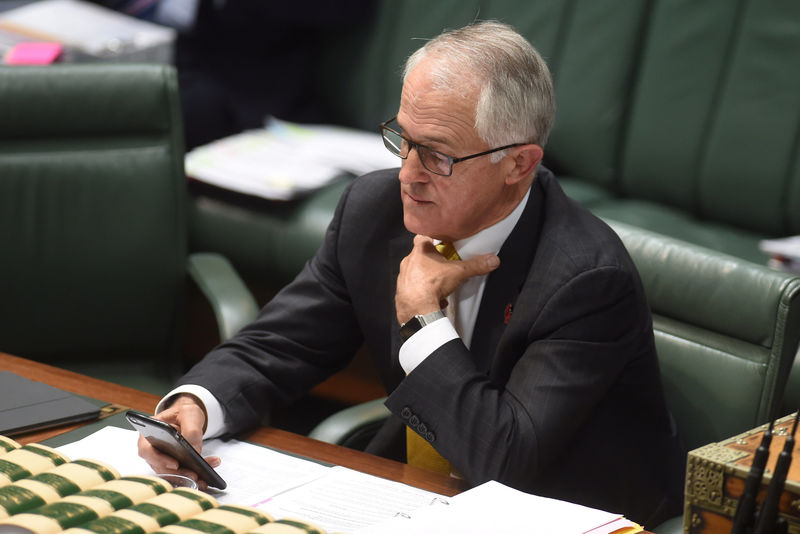* PM Turnbull names Foreign Minister Bishop as acting PM
* Says govt 'goes on', coping with ruling expelling deputy PM
* Turnbull delays trip to Israel, will travel there on Monday
* Govt considering changes to constitution on dual citizens (Recasts, updates with comment from Turnbull, adds bullets)
By Jane Wardell and Alison Bevege
SYDNEY, Oct 28 (Reuters) - Australian Prime Minister Malcolm Turnbull on Saturday appointed his foreign minister as acting prime minister as he tried to stem the fallout of a citizenship crisis that has cost his government its parliamentary majority.
Turnbull delayed until Monday a long-planned trip to Israel and held an emergency Cabinet meeting to shore up support after Australia's High Court ruled on Friday that his deputy, Barnaby Joyce, and four other lawmakers should be expelled from parliament because they held dual nationality. court's shock decision had immediate ramifications, stripping the coalition government of the one-seat majority it holds in the lower house, forcing it to call a by-election in Joyce's seat and sending the Australian dollar lower.
The opposition Labor Party has said it is considering a legal challenge to every decision made by Joyce since last year's election.
Turnbull said on Saturday that the deputy position would remain vacant until after the Dec. 2 by-election for Joyce's seat. The position normally goes to a member of the National Party, the junior partner in the coalition government.
Foreign Minister Julie Bishop, a member of Turnbull's Liberal Party, would instead be acting prime minister when he travels to Israel on Monday, three days behind schedule.
"Government goes on, good government goes on," Turnbull told reporters in Sydney, dismissing suggestions that the inability to agree on a deputy indicated tensions within the coalition. "When times get tough, that's when you put your arms around your mates."
Turnbull now needs the support of one of three independent lawmakers to keep his minority government afloat, with two sitting weeks of parliament left until it recesses for the year. At least two independent lawmakers have promised initial support, but noted that it may be conditional.
Turnbull is under particular pressure after refusing demands from the opposition to remove Joyce, who has renounced his New Zealand citizenship, from the cabinet while the court decided his fate.
CONSTITUTIONAL CHANGE
Turnbull said the court's interpretation of the constitution, which bars dual citizens from parliament in a bid to prevent split allegiances, was "very strict" and "very hard".
He added that he was considering whether to recommend a change to the constitution, noting that more than half of the country's population of 24 million was either born overseas or has a parent who was born overseas.
"Our objective is to ensure parliament is open to everybody," he said.
A referendum would be needed to change the constitution.
The High Court ruled on seven lawmakers, some of whom had already resigned. All seven accepted that they were dual nationals at the time of their election but claimed they were unaware of their status. Some were conferred a second nationality by birth, others by descent.
The others dismissed were all senators in the upper house and their seats can be assigned to party-appointed alternatives.
